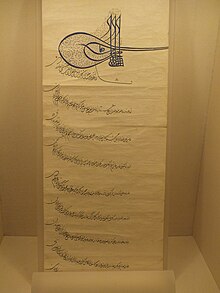Mülk
Da Wikipedia, l'enciclopedia libera.

Il mülk[1][2] era un tipo di proprietà terriera sotto l'Impero ottomano.[3][4]
Caratteristiche del mülk
[modifica | modifica wikitesto]Il mülk era simile alla terra di proprietà; i proprietari potevano acquistare, vendere e ipotecare liberamente ed era esente da alcuni tipi di tasse fondiarie.[5] Il mülk era qualcosa di più della semplice terra; poteva anche includere il diritto a pagamenti annuali del malikâne (un appalto delle imposte) da parte di mezzadri e agricoltori.[6]
Contesto
[modifica | modifica wikitesto]In gran parte del Vicino oriente, il mülk può essere contrapposto al miri, che era effettivamente una terra controllata dallo stato (probabilmente un ex mülk veniva confiscato a favore dello stato quando il proprietario non aveva eredi a cui trasmetterlo).[7]
In un certo senso, il mülk era simile alla proprietà del waqf.
Note
[modifica | modifica wikitesto]- ^ Antony Chadirji, Dizionario turco, arabo e persiano: ridotto sul Lessico del celebre Meninski in ordine alfabetico latino conservando l'ortografia dell'autore colla sola spiegazione italiana ..., Presso L. Nervetti, 1832, p. 598. URL consultato il 27 aprile 2022.
- ^ Annali. Istituto Universitario orientale di Napoli, Istituto orientale, 1940, p. 108. URL consultato il 27 aprile 2022.
- ^ Land tenure policies in the Near East, su fao.org. URL consultato il 27 aprile 2022.
- ^ Hans Georg Majer, Raoul Motika e Germany) Internationaler Kongress für Türkische Wirtschafts- und Sozialgeschichte (4th : : Munich, Türkische Wirtschafts- und Sozialgeschichte (1071-1920) : Akten des IV. Internationalen Kongresses, München 1986, Harrassowitz, 1995, p. 125, ISBN 3-447-03683-4, OCLC 34486845. URL consultato il 27 aprile 2022.
- ^ Mulk, su mideastweb.org. URL consultato il 27 aprile 2022.
- ^ Huri İslamoğlu-İnan, State and peasant in the Ottoman Empire : agrarian power relations and regional economic development in Ottoman Anatolia during the sixteenth century, E.J. Brill, 1994, p. 135, ISBN 90-04-10028-8, OCLC 29846424. URL consultato il 27 aprile 2022.
- ^ Ottoman Land Registration Law as a Contributing Factor in the Israeli-Arab Conflict, su web.archive.org, 16 settembre 2008. URL consultato il 27 aprile 2022 (archiviato dall'url originale il 16 settembre 2008).
Voci correlate
[modifica | modifica wikitesto]Text is available under the CC BY-SA 4.0 license; additional terms may apply.
Images, videos and audio are available under their respective licenses.
